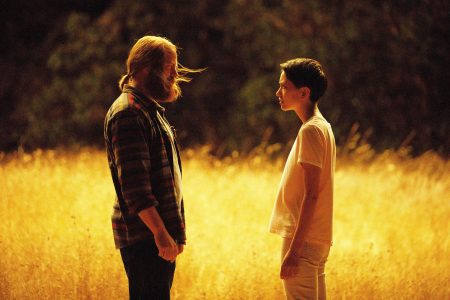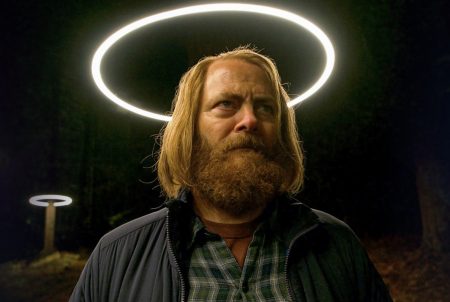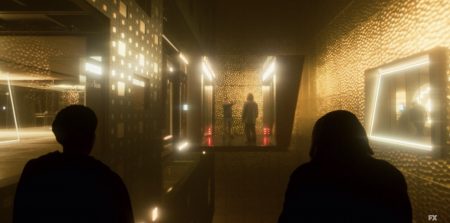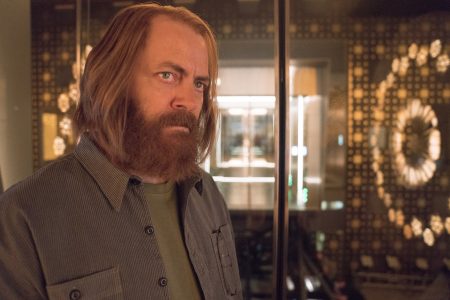Alex Garland’s recent miniseries, Devs (20th Television, 2020), takes on many similar themes which have been explored in his previous directorial outputs, including Ex Machina (A24; Universal Pictures, 2015) and Annihilation (Paramount Pictures; Netflix, 2018). A science fiction thriller, Devs follows the computer engineer, Lily Chan (Sonoya Mizuno), whose boyfriend mysteriously commits suicide after his first day working for the ‘Devs’ project. The project is run by the quantum computing company, Amaya. Amaya’s CEO is Forest (Nick Offerman), a tech entrepreneur, whose wealth has allowed him to develop the unique quantum mechanics facility. Notable members of staff are subsequently promoted to join Devs, where, in the first episode, Lily’s boyfriend, Sergei (Karl Glusman) is invited to join. Upon joining the program, we realise that Sergei has attempted to steal the Devs code, revealing himself as a suspected Russian industrial spy. Unbeknownst to Lily, Sergei is murdered by Forest and his head of security at the end of episode one for attempting to steal the code.
While the remainder of the story follows Lily’s attempt to find out the truth surrounding Sergei’s death, the series, as a whole, provides broader reflection on the tension between ‘free will’ and ‘determinism’. It is in this sense, that the series bears a relation to themes examined in Garland’s, Ex Machina, which follows an intelligent humanoid robot; and, Annihilation, which follows a group of scientists who attempt to enter a strange location on Earth where plants and animals are mutating.
Though Devs continues to draw upon these science fiction themes, I argue that the series pays homage to a far more interesting significance which has underscored Garland’s directorial style: his endings. In what follows, I will seek to explore how the ending of Devs’s exemplifies what the Slovenian philosopher, Slavoj Žižek, has referred to as a ‘parallax view’ (Žižek 2006a, see here for a previous discussion of this concept; see also Black, 2019). It is in the context of Žižek’s (2006a) parallax view that Garland’s ending can be approached, not for the answers it provides – a formative feature of any story’s ‘end’ – but, rather, the questions it proposes… spoilers ahead.
Determinism or Free Will?
We come to realise that the Devs project houses a quantum computer system, which is capable of projecting both the past and the future. In fact, for Forest the computer reveals that our past and future are predetermined; that is, we have no capacity to ‘choose’ our actions. We later learn that Forest’s convictions are framed by the death of his wife and daughter in a car crash, which Forest feels responsible for. In effect, Forest’s convictions, and the Devs program itself, serves as a wider reflection on debates which underscore quantum mechanics. Benjamin Curtis offers a helpful summary:
Quantum mechanics is a way of describing the universe at the atomic scale that is widely believed to be true. But whether it tells us that the universe (and so our lives) are predetermined is a hotly contested matter. … the two main interpretations considered in the show are the de Broglie–Bohm interpretation and the many worlds (or Everett) interpretation. According to both these theories, the laws of nature are fixed and deterministic. Everything has a specific cause and nothing happens randomly. And so, you might think, that settles the matter. If the laws of nature are both fixed and deterministic, so the thought goes, then everything that has ever happened and will ever happen flows from these laws, and the universe and our lives within it develop along a single inevitable path (or ‘tramline’, as Forest calls it). But things are a bit more complicated than this. The many worlds interpretation implies that the universe actually follows a multitude of inevitable paths, splitting into different versions of itself at every point that quantum mechanics means something could potentially occur in different ways – with each version being as real as every other. As the universe splits, so do you. On some paths you might be an astronaut, on others a hairdresser. But, crucially, this view of the universe is still consistent with the laws of nature being fixed and deterministic. The laws produce multiple different futures for each of us rather than a single future, but each of these futures is produced just as inevitably as if there were only one path. (Curtis, 2020).
This debate between Forest’s determinism and the potential of the ‘many worlds interpretation’ is played out in the series’s final episodes. Using the computer’s projection, Forest and his colleagues realise that at some point in the future the projections end, and this end is getting closer. In fact, the projection suggests that Lily and Forest will die, and that their actions will play some role in ‘ending’ the projection. Forest even shows Lily how the two of them will die, with Lily shooting Forest in an electromagnetic capsule within the Devs facility. After shooting Forest, the capsule will crash, killing Lily.
While Forest remains certain that this path will play out, as determined by the Devs computer, Lily and Forest proceed to the capsule both with the knowledge that they are going to die. Yet, before the capsule door closes, Lily throws the gun away, rendering the computer’s projection incorrect. Left inside the capsule with Forest, and with no gun, Lily is unable to kill Forest. Set against the computer’s determined projection, it would seem that Lily has committed an act of ‘free will’, thus changing her and Forest’s future.
Unfortunately, this doesn’t go to plan. Before the capsule can reach the facility’s outer entrance, a Devs colleague, Stewart (Stephen McKinley Henderson), cancels the electromagnetic field and the capsule inevitably crashes, with both Forest and Lily being killed. Despite their deaths, Forest and Lily suddenly awake in the Devs machine. Lily’s life has been restarted to the morning of Sergei’s first day at the Devs program. She later finds Forest alive, playing with his daughter and wife in the location where, in the previous reality, the Devs facility once stood. Forest explains how a Devs employee reconstructed both himself and Lily in the Devs machine before the moment of their death; effectively, both now live in a simulated reality inside the machine, from which they are the only two who are aware that they are living in a simulation. What is important, however, is that the machine can only run, and thus keep Forest and Lilly ‘alive’, if it functions via the ‘many worlds interpretation’. Forest’s existence now relies upon the very theory he sought to ignore.

Fig. 3: What does it mean to be alive in a many worlds configuration? Lily (Sonoya Mizuno) and Forest (Nick Offerman) in Devs.
Devs ending is one that continues to play with the tensions between a determined reality and the capacity to enact free will. Moreover, these philosophical contentions are played out amidst the De Broglie–Bohm and many worlds interpretations. Certainly, while Forest and Lily now live in a computer simulation, which relies on the many worlds’ interpretation, we are left unsure as to the correct interpretation that underscores the reality where Forest and Lily previously lived. In short, is this reality determined – notably, in both the computer’s projection and in the events that unfold, the capsule still crashes – or, do we have the free will that both Lily and Stewart perform? The unique ending has sparked various online debates, with Garland himself commenting upon the series ending (Hayner, 2020). Ultimately, however, the ending remains ‘open’ and it is here that we can offer further clarification with regard to Žižek’s (2006a) ‘parallax view’.
The Parallax End
Importantly, I do not want to provide Garland’s ending with a significance that simply ignores the possibility that one ever ends anything. Here, the glorification of an ‘open ending’ may simply suggest that one does not know how to end a show. Rather, what the ending of Devs exposes, however, is the power to offer a question, not an answer: a question which both maintains and requires our own position to be asserted.
To help clarify this, we can turn to Žižek’s (2006b) writing on the Slovenian music group, Laibach. In their performances, Laibach would frequently draw upon totalitarian, militaristic and national iconography that had a decidedly fascist edge. Performing in the former Socialist Yugoslavia, the group were subsequently censored and banned. For many critics, it was Laibach’s ‘political’ leanings which remained a contentious issue: were the band ironically mocking fascist forms of political discourse; or, were their ironic displays revealing a more insidious desire to profess totalitarian tendencies? Labbie offers further clarification on both the band and Žižek’s interpretation:
At the time, Slavoj Žižek wrote about Laibach as the perfect instance of a band who walked a fine line between fascism and left-wing intellectual politics. The difference depended on one’s perspective and the potential for the interpretation of irony. If one were a skinhead, then Laibach was appealing for its raw and earnest fascist beat and oppressive content. If one were a left-wing intellectual (or a pseudo or budding form of such a creature), then one read and heard Laibach with the irony which must be appropriate to any sort of cultural phenomenon that was so overtly offensive, ideologically informed, and utterly, potentially, and dangerously, regressive and oppressive. (Labbie, 2006).
In effect, therefore, Laibach’s performances ‘“frustrates” the system (the ruling ideology) precisely insofar as it is not its ironic imitation, but represents an over-identification with it’ (Žižek, 2006b: 65, italics removed). Indeed, ‘by bringing to light the obscene superego underside of the system, over-identification suspends its efficiency’ (Žižek, 2006b: 65). Notably, while critics, of both Laibach and Devs, ask questions requiring answers, it is the formal capacity of both Laibach and Devs to propose a question which redirects the focus to both the interpreter and audience. As a result, ‘By means of the elusive character of its desire, of the undecidability as to “where it actually stands”, Laibach compels us to take up our own position and decide upon our desire’ (Žižek, 2006b: 65).
In watching the ending of Devs, and its unanswered questions regarding the nature of our quantum universe, we are required to address our own desires and fears – in this case, desire and fears that abound any considered judgement on whether one has ‘free will’ or ‘determinism’. It is this ‘dual reading’ which has ‘come to signify for Žižek the “parallax view”’ (Labbie, 2006). While Žižek’s account of parallax denotes how an ‘“epistemological’ incapacity shifts into “ontological” impossibility’ (2006b: 66) – thus, ontologically framing reality itself – such a position seems to underscore Garland’s own take on the series end. In commenting upon whether Forest and Lily’s simulated existence matters, Garland notes:
If you are living and experiencing the thing, that’s what real is. So it’s not unreal. It’s just that they have an extra bit of information … If you choose to view the world where Sonoya [Lily] and Forest now exist as real, you have to give the same consideration to the other versions of the simulation that Forest alludes to. What Forest is saying is we have a certain awareness that this is the case and [there are] these other worlds … And in a way, if you were to believe in that particular multiverse way of looking at the world, that is also the state you and I are in right now. (Garland cited in Hayner, 2020).
It would seem that Garland’s ending bears witness to the ontological significance that Žižek’s (2006a) parallax view prescribes; one that is effectively rendered in the unique position that Devs’s ending proposes for its audience. Garland doesn’t have the answer; instead our desire remains ‘without guarantee, groundless, [and] authorized only in itself’ (Žižek, 2006b: 66). In finishing Devs, we are left with the question: what is our position?
Jack Black is a Senior Lecturer examining the interrelationships between sociology, media and communications and cultural studies. Drawing upon ‘traditional’ media forms (newspaper analysis) as well as television and film studies, Jack has examined a range of topics including nationalism/national identity; multiculturalism; and, collective memory. With particular attention afforded to the relationship between philosophy and critical social theory, this research expands upon the effects of ideology and power on culture and media representations.
References
J. Black, ‘Conviviality and parallax in David Olusoga’s Black and British: A Forgotten History. European Journal of Cultural Studies, 22, (5-6), 2019, pp. 979-995. doi: 10.1177/1367549419844451
Curtis, ‘Devs: explaining the philosophy at the centre of Alex Garland’s mind-bending TV Show’. The Conversation. https://theconversation.com/devs-explaining-the-philosophy-at-the-centre-of-alex-garlands-mind-bending-tv-show-137507
C.E. Hayner, ‘Devs Series Finale Ending Explained by Creator Alex Garland. Gamespot. https://gamespot.com/articles/devs-series-finale-ending-explained-by-creator-ale/1100-6476096/
E.F. Labbie, ‘“The Negation of the Negation is Not My Friend”’. Rhizomes, 13, 2006. http://www.rhizomes.net/issue13/labbie.html
Žižek, The Parallax View. Cambridge, Mass: MIT Press. 2006a.
Žižek, ‘Why are Laibach and the Neue Slowenische Kunst not Fascists?’ In The Universal Exception, edited by R. Butler and S. Stephens. New York, NY: Continuum (pp. 63-66). 2006b.






